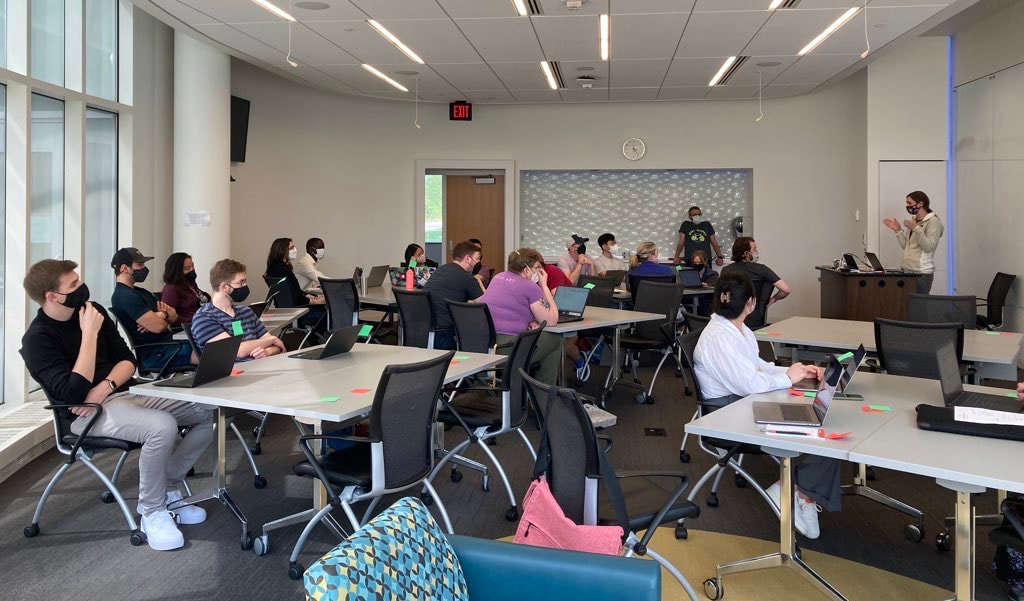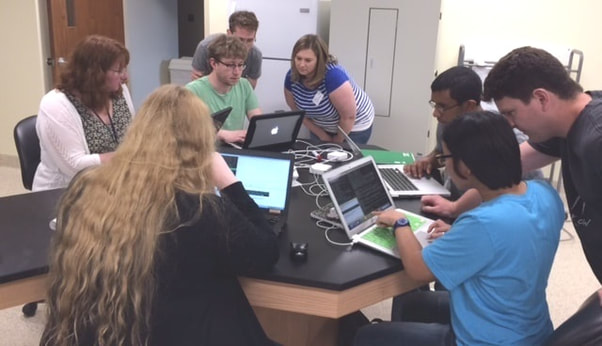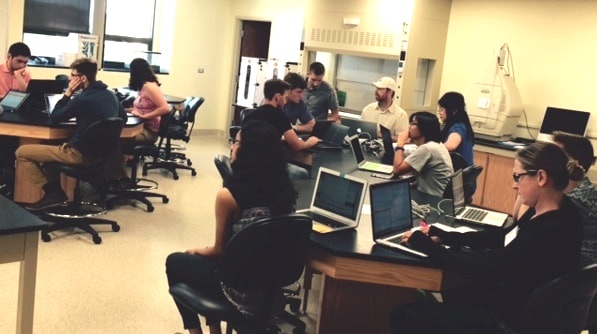University of Minnesota - Bioinformatics Enrichment Program
Department of Microbiology and Immunology
Department of Microbiology and Immunology
Workshop #1 (4/21/22): Introduction, accessing data on MSI, managing software using Conda environments, running QC on sequencing data
Workshop #2 (5/12/22): Read trimming, mapping, and aligning
Workshop #3 (6/16/22): Creating pipelines with Snakemake
Workshop #4 (09/15/22): Hands-on review session of all previous material
Workshop #5 (10/20/22): Basics of RNAseq analysis
Workshop #6 (11/17/22): Single cell RNAseq analysis
Workshop #7 (01/19/23): Basics of 16S rRNA amplicon sequencing with Mothur, DADA2, and QIIME2
Workshop #8 (02/16/23): Detection of Copy Number Variation in genome sequence data
Workshop #9 (03/16/23): TnSeq library construction and analysis
***All Department of Microbiology and Immunology staff, students, and faculty are welcome to attend. Please email Anna Selmecki for links and details.
Workshop #2 (5/12/22): Read trimming, mapping, and aligning
Workshop #3 (6/16/22): Creating pipelines with Snakemake
Workshop #4 (09/15/22): Hands-on review session of all previous material
Workshop #5 (10/20/22): Basics of RNAseq analysis
Workshop #6 (11/17/22): Single cell RNAseq analysis
Workshop #7 (01/19/23): Basics of 16S rRNA amplicon sequencing with Mothur, DADA2, and QIIME2
Workshop #8 (02/16/23): Detection of Copy Number Variation in genome sequence data
Workshop #9 (03/16/23): TnSeq library construction and analysis
***All Department of Microbiology and Immunology staff, students, and faculty are welcome to attend. Please email Anna Selmecki for links and details.
Creighton University - Bioinformatics Club (archive)
The Selmecki Lab organized the Creighton Bioinformatics Club - a cross-disciplinary group of researchers interested in improving our understanding and analysis of increasingly complex biological data. We review, discuss, and present on methods and software tools for next generation sequencing, proteomics, quantitative PCR, flow cytometry, etc. We host hands-on workshops in programming languages including Linux, R, and Python. Students and faculty present workshops on how to use programs for specific bioinformatics pipelines.
For our FREE, intensive week-long bioinformatics course - see below for more info.
For our FREE, intensive week-long bioinformatics course - see below for more info.
|
June 19-23, 2017
|
Selmecki Lab : Short Read Sequence Alignment Workshop
FREE and open to anyone interested in learning complete bioinformatics pipelines with whole genome sequence data. The objective of this course is to teach anyone, regardless of computational background, how to align whole genome sequence data to a reference genome. We will predominantly focus on small eukaryotic genomes, but the techniques are applicable to most all genomes. We will also only focus on short reads - those reads that you obtain from Illumina sequencing platforms. This course will provide the foundation for those interested in genomes/transcriptomes to analyze their own datasets. We will not analyze your data for you, however we will get you started and help you find the tools and resources that will accelerate your analyses! |
|
April 28th, 2017
|
Lucas Harrison, Hanson Lab Creighton University MMI Department
Workshop: SPAdes de novo assembly |
|
April 21st, 2017
|
Lucas Harrison, Hanson Lab Creighton University MMI Department
De novo assembly |
|
April 7th, 2017
|
Matthew Martin, Davis Lab University of Nebraska Omaha
Workshop: SNPeff and FreeBayes |
|
March 31st, 2017
|
Dr. Paul Davis, University of Nebraska Omaha
Exploring Mechanism of Resistance to Novel Anti-Toxoplasma Compounds |
|
March 10th, 2017
|
Curtis Focht, Selmecki Lab Creighton University MMI Department
Workshop: Introduction to Python Part 2 |
|
March 3rd, 2017
|
Curtis Focht, Selmecki Lab Creighton University MMI Department
Workshop: Introduction to Python Part 1 |
|
Feb 24th, 2017
|
Robert Thomas, Selmecki Lab
Different types of Sequencing methods |
|
Feb 17th, 2017
|
Dr. Holly Stessman, Creighton University Department of Pharmacology
Workshop: The UCSC Genome Browser and MIPGEN |
|
Feb 10th, 2017
|
Dr. Holly Stessman, Creighton University Department of Pharmacology
Targeted Sequencing: Multiplexed targeted next-generation sequencing using molecular inversion probes (MIPs) |
|
Feb 3rd, 2017
|
Mark Panning and Curtis Focht, Creighton University Department of Information Technology and Selmecki Lab
Workshop: Structure of a server, basic Linux, and Putty for no-Mac users |
|
Jan 27th, 2017
|
Dr. Alistar Cullum, Creighton University Biology Dept.
Workshop in R |
|
Jan 20th, 2017
|
Goals and Ideas sharing session
|
|
June 24th, 2016
|
Cameron Kieffer, Graduate student Creighton University Pharmacology Dept.
Introduction to Network Analysis Using Cytoscape What is Cytoscape and how might it benefit your research? Come and find out! This will be a FUN and interactive seminar. Before friday - Please go to http://www.cytoscape.org/ and download the latest version of Cytoscape and bring your computer to the seminar. Friday June 24th 12:00 Hixson-Lied Room 408 |
|
May 26th, 2016
**Thursday |
Dr. Josh Herr, University of Nebraska Lincoln
Metagenomics: Promises and Problems for the People A fun biological and computational seminar on the challenges with metagenomics and mixed sample data analysis. Josh’s research is broadly focused on identifying important microbe interactions with plants, insects, and humans. I think everyone will gain something from his talk, whether you’re a biology researcher or a summer intern with the IT department. ** Hixson-Lied Room 408 at 11:00 AM joshuaherr.com |
|
Dec 4th, 2015
|
Dr. Charles Brockhouse, Creighton University Biology Department
Meet the MinION: An Introduction to the Oxford Nanopore Sequencing Technology The Oxford Nanopore “MinION” is a portable DNA sequencer based on migration of DNA molecules through engineered protein pores. Single DNA molecules are nondestructively sequenced, with read lengths matching the length of the molecule. Sequences are returned in real-time, with in-line applications such as microbial identification built into the sequencing workflows. The long reads enable assembly of otherwise intractable genomes, and the novel sequencing method will allow direct identification of modified bases, protein contacts, and direct RNA sequencing. Some of the advantages and limitations of the technology will be presented in the context of the Simulium Genome Project. |
|
Nov 20th, 2015
|
Bill Boyle, Bourret lab Creighton University
Bill will present a research talk and his analysis pipeline for analyzing microarray data in R. This hands-on presentation is available to all whether you can attend or not! |
|
Nov 6th, 2015
|
Open workshop in R
Bring your computer and your data. Learn and share with others how you utilize R. |
|
Oct 16th, 2015
|
Dr. Brandon McKethan
Dr. McKethan will present on all aspects of quantitative realtime PCR and the MIQE guidelines. He will also be meeting with labs one-on-one to talk about experimental design and analysis. |
|
Oct 7th, 2015
|
Amber Sorenson, University of Colorado Boulder
|
Oct 2nd, 2015 |
Dr. Mehdi Keddache, Sr Sequencing Specialist at Illumina, Inc.
Dr. Keddache will present a research seminar and meet one-on-one with interested groups. She will discuss next generation sequencing experimental design, reagents, and costs for our MiSeq and other Illumina machines. |
Aug 21, 2015 |
Dr. Travis Bourret, Creighton University Medical School
Paper discussion: The composition and transmission of microbiome in hard tick, Ixodes persulcatus, during blood meal. Zhang et al, Ticks and Tick-borne Diseases 5 (2014). This is one of many recent papers investigating the tick microbiome. Interest in this research has been spurred by 1) the potential role of the tick microbiome in modifying the immune response of the tick vector, and 2) a desire to better understand the potential for coinfections and chronic diseases associated with tick bites, highlighted by post-treatment Lyme disease syndrome. This paper will be of general interest to the journal club members, as well as provide an opportunity to discuss using our MiSeq to perform 16s rRNA amplicon sequencing (something that the MiSeq is optimized for). |
July 24, 2015 |
Luke Harrison, 1st year grad student Hanson Lab, Creighton University
A SNP-based evaluation of hypersusceptibility in Pseudomonas aeruginosa. Luke will be presenting on both the results and the methodology of his whole genome sequencing comparative analysis between hypersusceptible mutants and their respective parent strains. |
July 10, 2015 |
Dr. Aleeza Gerstein, University of Minnesota
An introduction to R, open source software for statistical computing and graphics. Aleeza will also explain how to use diskImageR, an R package that she developed to quantitatively analyze photographs from antimicrobial disk diffusion assays. Aleeza's website: http://acgerstein.weebly.com/protocols--scripts.html |
June 26, 2015 |
Dr. Anna Selmecki and Luke Harrison
Paper discussion and overview of our first whole genome sequencing experiment on the MiSeq. Overview of the Next Generation Sequencing course we attended at the University of Colorado Boulder, organized by Dr. Robin Dowell's lab: http://biof-edu.colorado.edu/videos/dowell-short-read-class |




